MINOR SPOILERS FOR THE RINGS OF POWER EPISODE TWO AHEAD!
“There is a seed of courage hidden (often deeply, it is true) in the heart of the fattest and most timid hobbit, waiting for some final and desperate danger to make it grow….[Frodo] thought he had come to the end of his adventure, and a terrible end, but the thought hardened him. He found himself stiffening, as if for a final spring; he no longer felt limp like a helpless prey.”
– The Lord Of The Rings: The Fellowship Of The Ring, Fog On The Barrow-Downs, p. 140
There is a hint of irony in the title of The Rings Of Power‘s second episode, Adrift – for while we find our main characters cast off-course both literally and figuratively in episode two, this is also where the The Rings Of Power finds itself, and begins to deliver on its initial promise of unprecedentedly epic storytelling grounded in relatable human dynamics. As our characters drift further from familiar shores into dark and dangerous waters populated by the foulest of beasts, each of them transforms before our eyes into capable heroes, moved to decisive action by the sudden germination of that “seed of courage” within their hearts – a seed which in some cases, is buried deep in darkness, as Tolkien wrote. But as Elrond (Robert Aramayo) says of a mallorn sapling growing in the underground kingdom of Khazad-dûm, “where there is love it is never truly dark”.
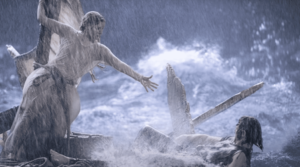
And it is love – in all its varied forms – that drives the characters throughout the second episode, leading them to do both great and foolish things in its name. For love of Middle-earth, Galadriel (Morfydd Clark) abandons the ship that would have taken her safely back to Valinor and swims the entire breadth of the Sundering Seas. For love of Bronwyn (Nazanin Boniadi), and to a lesser extent for her kinsfolk, Arondir (Ismael Cruz Córdova) investigates a network of tunnels built by orcs underneath the village of Tirharad, while Bronwyn, for love of her son, Theo (Tyroe Muhafidin), takes on an orc that got into her home. For love of a complete stranger, Elanor Brandyfoot (Markella Kavenagh) hides a secret from her family – one which could put all the Harfoots at risk.
Coming on the heels of a pilot episode that struggled to eloquently and concisely convey what The Rings Of Power was actually about, or how it stands apart from House Of The Dragon, The Witcher, and The Wheel Of Time, among other fantasy series’ currently on television, this episode’s clear focus on love as a catalyst for acts of courage ensures that there will be no doubt in viewers’ minds as to what kind of story this is – a decidedly earnest fantasy that seeks to uplift its audiences. That’s not to say The Rings Of Power doesn’t have dark and occasionally disturbing moments throughout, or that it won’t gradually become darker in future seasons when we get to the bits with human sacrifice and genocide in them, but there’s a fine line to be walked between exploring the darkness and actually reveling in it – one which Tolkien arguably never crossed, and which I don’t expect Rings Of Power to cross any time soon, either.
Besides, when so many of these characters are as endearing as they are because they love deeply and unapologetically, there’s no rush to put them in situations just yet where their love and unwavering faith in something greater than themselves isn’t enough to save the day. There’ll be plenty of time for that in later seasons. Right now, it’s crucial that our protagonists understand what it is to triumph, even if those triumphs are small and short-lived, so that every setback on the path ahead will hurt them – and us – twice as hard as it would otherwise. To use an example from The Lord Of The Rings, it would be a lot harder to empathize with Frodo’s suffering under the oppressive weight of the One Ring if we hadn’t already seen him at his strongest, spiritually, when that seed of courage awoke within him beneath the Barrow-downs.
The brief, triumphant moments we share with our characters in this episode hit me in the feels, though to varying degrees depending on which storylines I felt were generally well-executed and which needed a couple more refinements. Elanor Brandyfoot’s clumsy efforts at communication with the mysterious Stranger (Daniel Weyman) who fell out of the sky in episode one, culminating in her earning his trust enough that he no longer wails in fear every time she spooks him, belong squarely in the former category, because while not the most action-packed subplot by any means, there’s real emotional heft to every interaction between the two.
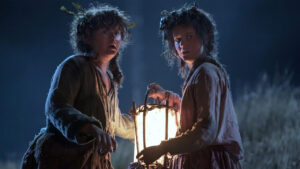
On the opposite end of the spectrum, Galadriel’s victory over the perils of the Sundering Sea didn’t resonate with me as strongly, because the perils in question turn out to be weightless in comparison to everything she’s already confronted and conquered in her life (even her hotly-anticipated underwater encounter with a sea monster lasts all of ten seconds before she escapes by simply…swimming in the opposite direction), and because the only thing gained from this subplot is Halbrand (Charlie Vickers), a shipwrecked Southlander who shares with Galadriel the first hard evidence that Sauron has returned. Given that Halbrand’s character is fairly unimpressive, and that Vickers’ performance gets only a “let’s wait and see” out of me, I’m not sure that we gained more than we potentially lost in the ten to fifteen minutes this subplot eats up.
And I’m still salty that the sea monster fight never materialized! As someone who’s equal parts fascinated by the sea and terrified of what lurks beneath its surface, I was really looking forward to an action-sequence like nothing we’d ever seen before in the legendarium or its adaptations – but either the budget couldn’t support such an action-sequence (I find that hard to believe), or it got cut for time (which I can believe, because television executives are always making stupid decisions like that). At least the monster took out all of Halbrand’s equally irritating crewmates before vanishing back into the ocean depths.
While we’re on the subject of action, I must admit that The Rings Of Power is severely lacking in this department – and it can’t exclusively be due to budgetary concerns, because even action-sequences requiring relatively little CGI fizzle out before they get started. My best guess is that, in an effort to conceal instances of poor fight choreography and protect the dignity of actors still mostly new to wielding swords and axes, these sequences were edited to the point where they now hardly exist. The exception to the rule is the second episode’s fast-paced, close-quarters brawl involving Bronwyn, her son Theo, and a single orc that claws through the floorboards of Bronwyn’s home. A single orc might not sound so bad when we’ve seen swarms of them onscreen before, but through the lens of The Orphanage director J.A. Bayona, this orc has all the presence of a slasher-movie villain; its movements slow and purposeful, its design genuinely grotesque (those practical effects are just…*chef’s kiss*), and its fate appropriately gruesome.
But the sequence is still too short, and the orc doesn’t rack up any kills the way a slasher-movie villain should. I mention this only because I think The Rings Of Power‘s stakes are still somewhat unclear after two episodes (a little Sauron does not go a long way, as I wrote in my review of episode one), and a minor character’s death at the hands of an orc would have made a big difference. I suppose there’s still time for that, but the stakes diminish slightly whenever characters walk unscathed from a fight, and so far that’s all they’ve done (well, with the exception of Galadriel’s brother Finrod, but we hardly knew him and he died offscreen). Arondir gets captured by orcs, but I’m fairly certain he’ll escape by the end of episode three and return to Tirharad to help Bronwyn muster the Southlanders to her cause.
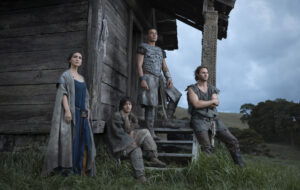
Theoretically, however, the stakes are ridiculously high right from the get-go – we’re talking end of the world, end of life as we know it, all that good stuff. That’s what Galadriel claims will happen if Sauron’s imminent return is unchallenged, and although we have yet to see much (or, come to think of it, any) proof of her claims, I’ve read The Lord Of The Rings and its appendices, so I know she’s right, and I know there will be many opportunities in the near future for us to see Sauron in action, so we never have to end up in a Game Of Thrones type situation where they keep telling us a bad thing is gonna happen, but then when it happens, it’s actually not that bad.
In this case, the bad thing really is gonna happen and it’s gonna be worse than Galadriel could have possibly predicted (the source material being written already makes that a guarantee). But that’s several seasons down the line, and The Rings Of Power needs to start laying the groundwork now for the bad thing to happen then, so that viewers who haven’t read the books and don’t remember the movies know what this is all building towards. So far, the prologue’s attention-grabbing aerial battle between Morgoth’s fell beasts and a giant eagle of Manwë is still more visually impressive than anything Sauron has done (onscreen, to be clear), even during the First Age of Middle-earth.
On the margins of the main story, where the stakes are still high but not quite so unfathomable, it’s easier to convey the consequences a minor slip-up could have, and this ties into my earlier point regarding the joyful and triumphant moments we need to share with the characters – because while you can kinda get away with being vague about what the end of the world really means (the fantasy genre’s been doing that forever, and the appeal hasn’t worn off), when the stakes are small they need to be clear. And The Rings Of Power mostly succeeds on this front, especially where the Harfoots are concerned: from the moment they’re both introduced, we’re first shown and then frequently reminded that the Harfoots are a nomadic people who survive by moving out of harm’s way in a twinkling. So when Elanor’s father, Largo Brandyfoot (Dylan Smith), breaks his ankle, we understand immediately that the consequences this could have on Elanor’s family and the entire community are devastating.
Likewise, I’m invested in Elrond’s storyline not because I particularly care whether he’s successful in brokering a deal with the Dwarves of Khazad-dûm on behalf of Lord Celebrimbor (Charles Edwards), but because it turns out that there’s a lot more at stake here for Elrond than he let on – his friendship with the Dwarven prince Durin IV (Owain Arthur) is riding on this, and Durin already feels betrayed by Elrond for missing his wedding, the birth of his children, and a whole bunch of other milestones in Durin’s relatively short life that Elrond, as an immortal Elf, forgot were important. Whether or not you can relate to that exact experience, most of us have been in roughly analogous situations.
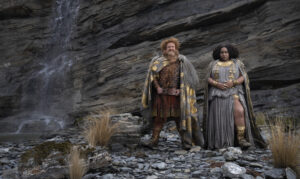
And if you’ve ever had to mediate between two estranged friends (or frankly, even if you haven’t), I think you’ll be drawn to the character of Disa (Sophia Nomvete), Durin’s wife and Elrond’s only other close acquaintance amongst the Dwarves, to whom both turn for help in getting through to the other over an awkward dinner. Mediation is Disa’s primary role throughout this episode, where she indeed appears only briefly, but we learn so many interesting details about her, and Nomvete’s performance is instantly so warm and heartfelt, that I feel as though we’re only scratching the surface of what could be done with her character – a “Resonator” responsible for singing to Khazad-dûm, not its people but its stones.
Resonators like Disa are a welcome new addition to the lore, which has surprisingly little to say regarding Dwarven culture and customs even in the Third Age, much less the Second. If The Rings Of Power freely invents original material here and in other corners of Middle-earth, it’s because there’s plenty of space in this sandbox to flesh out all the characters that to Tolkien were just names on a family-tree, and reconstruct from imagination all the great cities that the Fellowship of the Ring never got to see when they hurried across Middle-earth at the end of the Third Age. It’s not lore-breaking to let “other minds and hands” add to the great tales Tolkien left behind.
In one particularly beautiful example of this, The Rings Of Power‘s unconventional (but decidedly charming) version of Celebrimbor regales Elrond with a story of the First Age that comes to us not from The Silmarillion or Unfinished Tales, but from the writers’ own imagination – and the potent simplicity of the story they’ve created, one in which the Great Foe Morgoth gazes so long upon the beauty of the Silmarils that he weeps a single tear in which his terrible visage is reflected, finally breaking the spell Fëanor’s work had cast over him, is so evocative of Tolkien’s own writing that I had to double-check to make sure this detail wasn’t mentioned in any of the published works. The deliberate caveat that this story is merely a legend amongst the Elves means that you can integrate it into your readings of The Silmarillion or disregard it entirely, if for whatever reason it doesn’t work for you.
So, as sacrilegious as it may be to say this, maybe original content can be good sometimes, actually? Maybe there’s beauty to be found in these stories that don’t have a basis in the canon but still encapsulate the integral themes of Tolkien’s Second Age writings, besides being – for the most part – really well-written, well-acted, and visually spectacular in their own right?
I don’t know about you, but I’ll not soon forget the experience of seeing Khazad-dûm revealed in all its ancient glory on the biggest screen possible (I was lucky enough to attend a theatrical screening of the first two episodes). As Bayona’s camera swooped through an underground wonderland awash with blazing sunlight, capturing and crystallizing every last detail at which the author’s pen can only hope to indicate, all the while accompanied by Bear McCreary’s bellowing Dwarven theme (which has been stuck in my head for the past several days), I realized that whatever other sensations The Rings Of Power evokes in me, first and foremost among those will always be love for Middle-earth – of that, I’m already confident.
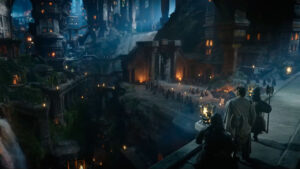
I love being back in this world where love is a power innate to all people that can awaken in them the capacity for earth-shaking heroism, and the fact that The Rings Of Power conveys all that in just the first two episodes is why my eyes are brimming with tears just writing these words, because even if all the new fans introduced to Middle-earth by way of this series never continue on to the books (though many will, I’m sure), in the end I believe The Rings Of Power is worthy to stand alongside a handful of other great adaptations of Tolkien’s works that get it. This is a story about love. I sincerely doubt that Jeff-I-Want-My-Game–Of–Thrones-Bezos knew when he commissioned this project that what he’d get would be the literal antithesis to the harsh cynicism of Thrones and its successors, but based on The Rings Of Power‘s global viewership numbers, it looks like love wins.
Episode Rating: 8.5/10